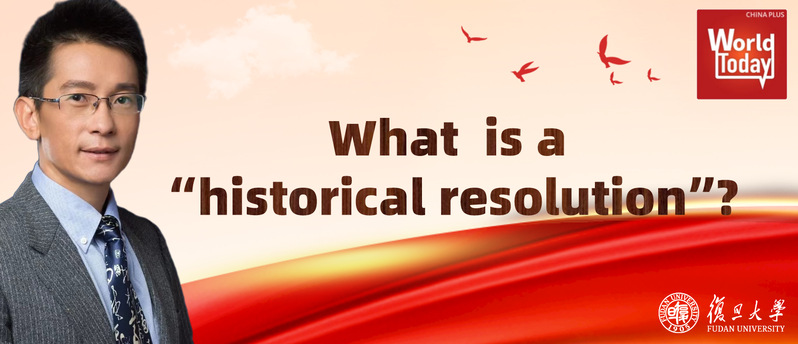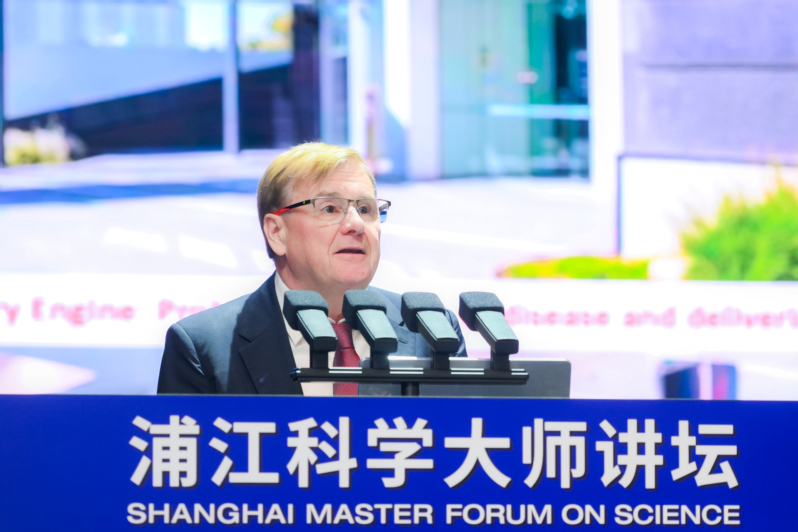
A high-profile meeting of the Communist Party of China has adopted a resolution on the major achievements and historical experiences of the 100 years of endeavors of the Party. The resolution was adopted at the 6th plenary session of the 19th CPC Central Committee, which experts say has mainly answered questions about why the Party was successful in the past and how it can continue to succeed in the future. So, how significant is it and what does it mean for the future of the country and its people?
Dr Wang Zhengxu, professor of political science from the School of International Relations and Public Affairs at Fudan University was invited to speak on the live radio program World Today presented by China Plus, a podcast discussing China’s news, people, traditions and culture from a Chinese perspective, run by China Radio International. Also joined the show were Dr. Lauren Johnston, visiting senior lecturer at the School of Economics and Policy at University of Adelaide, and Dr Timothy Kerswell, research fellow at Advanced Institute of Global and Contemporary China Studies at Chinese University of Hong Kong.
Q1:Can you first help us understand the significance of the meeting?
Wang:Every year, one of the major political events of the country and of the Party is the plenary session of the Central Committee. This year, the 6th plenary session of the 19th Central Committee is especially important, as it will be followed by the 20th Party Congress which is due next year. Second, before this plenary session, the Party had announced that there was going to be a major document regarding the historical record of the Party that would come out of this plenary session. Many people had very high expectation regarding what would come out. This is why the plenary session this year is important.
Q2:The resolution is mainly about summarizing China’s past experiences and achievements, but why is history so important for the Communist Party of China?
Wang:Yes indeed. You don’t normally see a political party in other countries making a critical document or decision resolution regarding a period of its history. This has to do with how the Party organizes itself, and it is part of the Chinese intellectual tradition to attach importance to history because history has a very important role in shaping how people think and what people want to achieve in the future. For the Party, it’s very clear that this resolution is different compared to the two previous resolutions. The two previous solutions were more about clarifying the Party’s history and there was some records that needed to be clarified. This time it was more about summarizing and concluding what the Party has achieved, what lessons are there for the Party to carry forward. Such a document will become an important element of the Party’s canon, or a fundamental text which records and interprets the Party’s history. So it becomes part of the Party’s life, so it is no more history. Through these kinds of communique or documents, the Party has connected its past with what it is for the time being and with what will go on to be in the future. It reveals the Party’s identity, the Party’s spirit and the Party's future direction.
Q3:What do you think are the tough problems and also the things that the Party wanted to get done but never got done?
Wang:The Party put forward this formulation at the 19th Party Congress already, saying that since the 18th Party Congress, it has been able to tackle many difficult and big problems that the Party wanted to tackle but was unable to. I would summarize a few areas that would showcase how the Party has moved forward since 2012 or 2010. First, China has witnessed overall economic development, especially in poverty eradication. From the 1980s, China’s economy has been growing fast but absolute poverty was still there. It was only a small portion of the population, but it was a major task for the Party and for the whole country’s socialistic ideals. So achieving the eradication of poverty in 2020 was one of such big achievements. Second is fighting and limiting corruption in the Party and the government. There were serious concerns that corruption has been going quite wild within the Party. By 2012, the Party launched a new campaign of anti-corruption and built institutions that would enhance the Party’s ability to limit future corruption. Third I think it is a very major effort of institutionalization. Under Xi Jinping’s leadership, the Party has developed a wide range of institutions that formalized many Party and government processes and policies. It was a big leap compared to the 1980s and 1990s. Since 2012, with Xi Jinping’s top-level design, the Party has been developing its own policies and institutions very well. This resolution that came out of this plenum is part of the Party’s action to formalize and institutionalize many things. Lastly, with the first and second centennial goals for economic, social, political, cultural and ecological development, the Party has been pushing forward an ambitious agenda.
Q4:As China gets stronger, the rest of the world is probably wondering what China's goal really is and what is China off to and what about its new ambitions.
Wang:China persists in communicating with the rest of the world. China remains a developing country. It is very large and very diverse. There are so many domestic challenges for China to work on. Despite the fact that China has a very ambitious goal of comprehensive modernization of the whole country, it is telling the world that China’s development is to raise its people’s living standard, to build an affluent society, and not to challenge other countries. Some people in the United States say that China is becoming a hegemon, and that China is upsetting the world order. I think their concern is not about China’s rise per se, they are worrying the US is losing its position as a superpower in the world. It is less about China but more about itself. Our goal is national rejuvenation, industrialization, development and modernization. It’s really about improving people’s living standard. I just talked to Professor Graham Allison who wrote a book on the Thucydides’s Trap between China and the US. What people actually see is China’s economic development. But China is not becoming a military power, not become an aggressive imperialist power. They see the rise of China in a wrong way, and they feel insecure, because they worry they will lose supremacy.
Q5:How should we understand the power to shape? What does China want to shape?
Wang:We can start from China’s fundamental principles or values in conducting foreign affairs. It’s a kind of change for the world, the world is changing and China is a part of this change. The world’s order, the world’s power structure or the world’s institutions were formed after the Cold War. It was an order mostly dominated by western powers especially the United States, so there are many things, in terms of power distribution and rules, that are unfair to developing countries and third world countries. Weak countries have no power to change or affect those. They have to just accept such a power structure or such an order. I think the document and the quote you mentioned are meant to say that China has now some influence and it wants to turn the world into a better place for everybody, not let it continue to be a world dominated by one power or dominated by the western bloc. So what the power wants to shape? Now China has some ability to reform the world order through G20 and many other global or multilateral institutions and platforms. China now has a bigger voice. It can play a bigger role, and it can use some of the platforms that China has started, such as the BRI and the Asian Infrastructure Development Bank. This kind of new platforms created by China or co-founded by China will shape and reshape the world in some way. China at this phase has some ability and will have more ability to reform and to reshape the world.
Q6:The communique also mentioned the term “whole-process people’s democracy” and also at a press conference this morning, a senior Chinese official said democracy is not a patent of the west nor can it be defined by the West, and he said Western democracy is a democracy dominated by capital, a democracy of the rich is not true democracy. So can you tell us what the “whole-process people’s democracy” actually means and why is China highlighting the ideological differences?
Wang:If you call the ideological differences a warfare between China and the West., then the West is playing offense, saying that only certain forms of government or the U. S. way, can be called democracy. That is, you must have multi-party, bi-party elections and you have re-election of the national leaders. I think this is a Cold War legacy that Western countries use as a political tool to delegitimize the non-western countries which don’t have a bi-party or multiparty election. In the past China didn't quite care about these things. China was focusing on its domestic development but you know the U.S. is trying to continue to delegitimize China, China’s model and China’s development. The most frequent weapon that U. S. uses is the delegitimization of China's government form, and says you have one party so you are not a democracy. China is now using China’s way to define and interpret what democracy is and saying, look, you cannot dictate, you cannot monopolize the definition of democracy. Democracy is the value that government needs to be a government for the people, and then every country has tried their own way to materialize this idea of democracy. China has done its part, as it has developed a very elaborate system of government of political participation. Although it doesn’t have bi-party or multiparty elections, it is definitely practicing and building democracy, and we will call the system “whole-process people's democracy”, because in every aspect of government or public affairs, we have a democratic element. We have participation. We have supervision, accountability and transparency. We have citizen’s rights protected and enabled. In this way I think the idea of “whole-process people’s democracy” refutes the U.S.’ monopoly of democracy.
Q7:When we talk about national rejuvenation, of course part of that includes the reunification of Taiwan and some have compared this communique with the one passed at the fourth plenary session in 2019 which stated that the Central Committee will advance the process of peaceful national rejuvenation and promote cross-strait relations and also work with Taiwan compatriots to step up economic, cultural and people-to-people exchanges between the two sides. However this communique is taking a stronger tone without mentioning “peaceful reunification” or “people-to-people exchanges” and it is stated that we firmly oppose the separatist forces seeking Taiwan independence, that we firmly oppose foreign interference, and that we have maintained the initiative and ability to steer cross strait relations. Is China still looking at peaceful reunification?
Wang:I think the goal of course is to achieve unification through peaceful means, and China still has the patience. The United States has tried a salami strategy, the U.S. is pushing the red line, pushing the envelope. Just today or yesterday, a delegation of U.S. congressman visited Taiwan. Just a few weeks ago the leader of Taiwan acknowledged that there are U.S. military service people servicemen on the Island, so there are some people trying to push the envelope, trying to step across the red line. China is raising its tone of voice, on the one hand, through this document you referred to, but on the other hand, stepping up military responses, trying to show the resolve that China is determined to prevent any real effort to make Taiwan independent.
Q8:Let's look at the economic front. We talked about on China's efforts to try to bridge the gap between the rich and poor, because four decades ago, Deng Xiaoping declared that China wanted some people get rich first, but now President Xi says that the country will pursue common prosperity. Dr Johnston just now said this is not about punishing the rich, but is about helping the poor. How is China going to do with those and do you think this will lead to more government interventions and perhaps affect the innovation and competitiveness of the private sector?
Wang:I think maybe it’s important to understand the socialism in China. China being a socialist country, the Party’s line is we are building socialism with Chinese characteristics. Socialism is getting more attention in the West, the U.S. is saying U.S. is too capitalist and it needs much more socialism. Deng Xiaoping was insightful in realization of socialism with Chinese characteristics. It is about common prosperity. You cannot let a large proportion of people lag behind and you cannot just have a few proportion of people becoming rich. To achieve such a goal, certainly the state and the government should play a much more purposive role in adjusting policy and in restructuring some sectors when they're not serving the country. And these sectors probably need to be phased out. So for this goal, to make more people enjoy the economic benefit of the country’s development more equally, the government of China needs to play a much more purposive role than governments of Western countries.





